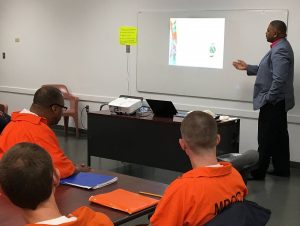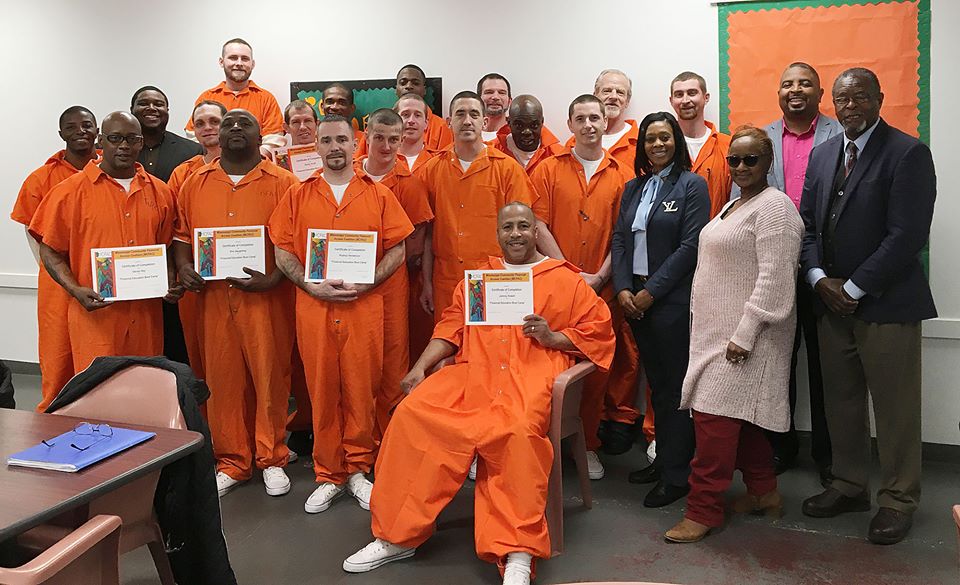The Mississippi Department of Corrections is teaching their parolees and probationers how to get their finances on track. While completing their term at the Technical Violation Center at the Delta Correctional Facility, parolees, probationers, and others on supervision have learned how to save money, reduce their debt, establish or re-establish their credit and ultimately get their finances on track.
The first Financial Education Boot Camp ended earlier this month at the facility in Leflore County, with a graduation ceremony for the participants.
“I am extremely pleased to see this type of program offered at the TVC,” Commissioner Pelicia E. Hall said. “Many of the reasons people end up in the prison system can be traced to finances. But everyone can benefit from financial education because it is so important to our well-being.”
Deputy Commissioner Christy Gutherz, who oversees the TVC program in the MDOC, said programs like the financial boot camp provide basic information for decision-making essential to money management.

“As the MDOC peels back the layers of re-entry, we realize more and more that basic life skills are needed for our population,” Gutherz said.
The financial education classes were sponsored by the Mississippi Community Financial Access Coalition (MCFAC), which partners with local community banks and other financial institutions, faith-based organizations, nonprofits, and high schools and colleges to offer training to the public.
Program participants also spoke on how meaningful the financial boot camp was for them during the up to two-hour sessions over five weeks.
“It has taught me a lot about different financial problems,” Entonio Hines, 34, said in his written assessment. “When I am released from (the TVC), I can take this knowledge with me (and) show … others about finances and credit problems. I will also start a savings account for my son, and I will also start me (an) emergency savings.”
Nathan Bafford, 48, said he participated in the boot camp not expecting it to help but was surprised after the first class.
“I learned about net worth, actual cash value vs. replacement cost and setting milestones, I knew that I was in the right class,” said Bafford. “As weeks passed by quickly, I learned about predatory lenders, how to establish/rebuild credit, money management and about various products that banks offer customers with bad or no credit. I’ve saved all of this information as a guideline so that I may clear my debts and build a strong financial foundation.”
Forty-year-old Jason Smith said he wants to use the certificate he obtained for completing the program to get a loan for his small business of carpentry and painting.
“I also want to build my credit up for a new home, and one day have it (paid) off for my family.”
Christopher Lewis, who works for one of the banking partners with MCFAC, was one of the two instructors.
“I really believe that once they are released, (the participants) will achieve some things and not end back up in those predicaments because finances were the root of the decisions they made,” said Lewis, who is employed by Planters Bank & Trust Co. “Being armed with the knowledge on how to make the right decisions, they will start off on the right path knowing the proper way to do things about supporting their families, their loved ones and themselves. Having that knowledge will make a world of difference.”
Lewis said the setting at Delta was a first for him where he has previously taught in a host of other places, including schools, churches, colleges, and nonprofits.
“MCFAC’s mission is to coordinate, promote, and expand access to personal financial education, economic inclusion, and consumer protection for individuals and families throughout the state,” Lewis said. “Our emphasis is on the underbanked, unbanked, and underserved.”
The financial education course at Delta falls under one of the three types of TVC classes. Programming includes Courage to Change, which addresses cognitive behavior, Smart Start, a pre-employment program, and Living in Balance, which provides substance abuse services.
“Career awareness is part of the Smart Start Curriculum, and financial awareness is an objective taught under the career awareness component,” said Warden Sonja Stanciel, who oversees programs at the TVC. “The program was offered at a local church so I thought it would be good to do it at Delta in conjunction with Commissioner Hall’s vision for re-entry.”




